 Petzlover
Petzlover Braque du Bourbonnais is originated from France but Smalandsstovare is originated from Sweden. Both Braque du Bourbonnais and Smalandsstovare are having almost same height. Braque du Bourbonnais may weigh 7 kg / 16 pounds more than Smalandsstovare. Both Braque du Bourbonnais and Smalandsstovare has almost same life span. Both Braque du Bourbonnais and Smalandsstovare has almost same litter size. Both Braque du Bourbonnais and Smalandsstovare requires Low Maintenance.
Braque du Bourbonnais is originated from France but Smalandsstovare is originated from Sweden. Both Braque du Bourbonnais and Smalandsstovare are having almost same height. Braque du Bourbonnais may weigh 7 kg / 16 pounds more than Smalandsstovare. Both Braque du Bourbonnais and Smalandsstovare has almost same life span. Both Braque du Bourbonnais and Smalandsstovare has almost same litter size. Both Braque du Bourbonnais and Smalandsstovare requires Low Maintenance.
 The Braque du Bourbonnais is an ancient breed, seen in the 15th century in France in the province of Bourbonnais. He became extremely popular with hunters by the 1800’s as a good pointer. He has become very popular in the United States and all of North America. There are often more puppies born in the U.S. than in France. The British call this breed the Bourbonnais Pointing Dog.
The Braque du Bourbonnais is an ancient breed, seen in the 15th century in France in the province of Bourbonnais. He became extremely popular with hunters by the 1800’s as a good pointer. He has become very popular in the United States and all of North America. There are often more puppies born in the U.S. than in France. The British call this breed the Bourbonnais Pointing Dog.
As with so many European hunting and working dogs, the Braque du Bourbonnais almost disappeared following World War I but was saved by the first breed club, established in 1925. Then following World War II, they were again in danger as the club dissolved and birth rates among the breed decreased drastically.
Actually, there were no dogs at all in the French registry between 1963 and 1973. This was attributed to the fact that the registry put more emphasis on the secondary characteristics such as color, length of tail) instead of the hunting characteristics. Because of this some hunter-breeders vowed to bring the real Braque du Bourbonnais back.
Michel Comte took on this task in 1970 but could not find any dogs with pure Bourbonnais blood. So, he took missed breed with characteristics like the Bourbonnais and inbred several litters until he had a dog he was satisfied with. He registered this dog with the LOF in 1973-75. Seeing this several other breeders got into the act and they successfully brought the breed back.
Michel became president of the new Club du Braque du Bourbonnais in 1981 and remained so until 2001. During this time the breed excelled at field trials and was first sent to the U.S. in 1988. The breed is now thriving in both Europe and North America.
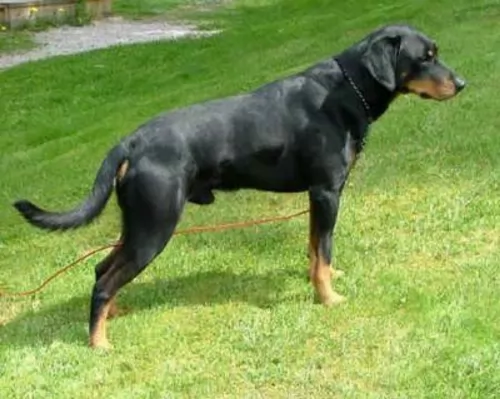 The Smålandsstövare has got quite a long history and dates back to the 1600s. He is the smallest of the Swedish hound breeds. This is a scenthound.
The Smålandsstövare has got quite a long history and dates back to the 1600s. He is the smallest of the Swedish hound breeds. This is a scenthound.
Hounds similar to the Smålandsstövare were bred with European hounds and then brought to Småland and bred with local spitz-type farm dogs to create the foundation stock for the Smålandsstövare.
The dog was used to hunt but nearly died out in the 20th century, but breeders restored it and the first official standard emerged by the Swedish Kennel Club in 1921.
The Smålandsstövare is a rare dog breed but it is recognized by the American Rare Breed Association as well as other major kennel clubs, one of which is the Federation Cynologique Internationale as well as the United Kennel Club.
 This is an elegant breed with a medium sized, muscular bod and a round head. The nose will be the color of the coat and the muzzle is cone shaped with a wide base. He has large dark or hazel eyes, again depending on the color of the coat. The ears can drop below the throat and the neck is very muscular. He has a deep, wide chest and straight, muscular legs. The coat can come in two colors – liver and fawn – and ticked or spotted. They have a typical short pointer type tail.
This is an elegant breed with a medium sized, muscular bod and a round head. The nose will be the color of the coat and the muzzle is cone shaped with a wide base. He has large dark or hazel eyes, again depending on the color of the coat. The ears can drop below the throat and the neck is very muscular. He has a deep, wide chest and straight, muscular legs. The coat can come in two colors – liver and fawn – and ticked or spotted. They have a typical short pointer type tail.
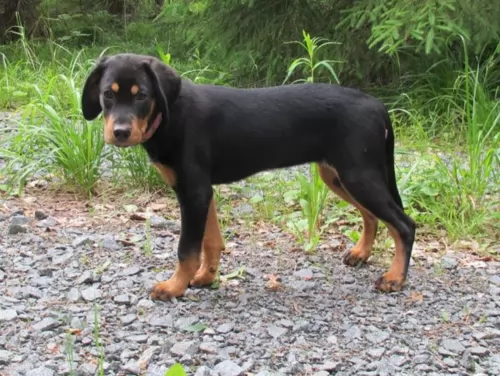 The Smålandsstövare is a muscled, compact looking dog. The double coat is shortish to medium length and is thick and quite coarse to the touch. He sheds seasonally. The coat is usually black with tan markings.
The Smålandsstövare is a muscled, compact looking dog. The double coat is shortish to medium length and is thick and quite coarse to the touch. He sheds seasonally. The coat is usually black with tan markings.
The high set ears are medium length and floppy, the head is slim and the tail can be naturally short. Sometimes the tail is long and can be slightly curved in the spitz-like sabre fashion.
The eyes are brown and friendly. The height of these dogs is about 46 to 54cm and he weighs anything from 15 to 18kg.
Usually a well behaved, quiet, calm, gentle dog, the Smålandsstövare takes his role as guard dog seriously, wanting to protect his family.
His good temperament ensures he gets on well with all members of the family. He is full of energy and will need to be exercised well, whether it be ball games in the garden, a walk around the block, a run in the park or joining his family on hikes and camping trips.
It is why he won’t settle down well on a small property in the city. He needs larger premises to expend his energy, and if in cramped premises without exercise, he may resort to barking and whining and this may well drive your neighbors bats.
Training and socializing your Smålandsstövare will be necessary and it should be easy as he is intelligent.
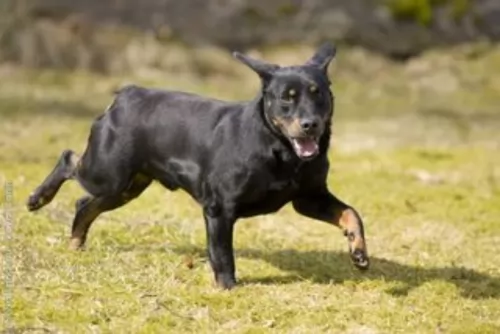 The Smålandsstövare is a robust dog with a lot of stamina. He will be wanting a lot of exercise and is ideal as a pet in the suburbs or the countryside but not ideal for city living.
The Smålandsstövare is a robust dog with a lot of stamina. He will be wanting a lot of exercise and is ideal as a pet in the suburbs or the countryside but not ideal for city living.
He makes a wonderful family pet, forming strong bonds with his owners. He makes an excellent watchdog too wanting to protect his family, and with this amicable, calm dog, you’re going to have a true friend.
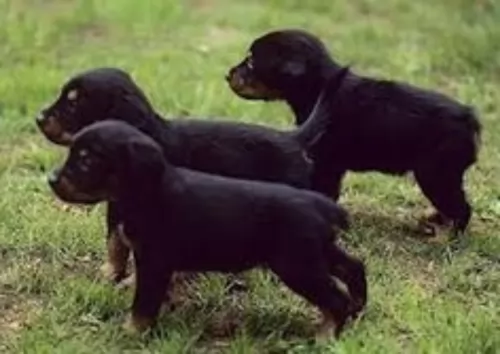 The Smålandsstövare is a rare dog breed and not much is known about congenital conditions to which he may be particularly prone.
The Smålandsstövare is a rare dog breed and not much is known about congenital conditions to which he may be particularly prone.
With good care he can reach 14 or 15 years of age. The floppy ears put him at risk for ear infections, while other conditions to watch for include hip dysplasia, cancer, bloat and obesity.
If you see your dog shaking his head or pawing at his ears, look inside because the ears may be red and inflamed. It is important to get help quickly for ear problems in dogs.
Ear canals are sensitive so if you don’t want to clean the ear and work on it yourself it is important to get your pet to the vet. The vet will clean your dog’s ears and also prescribe antibiotics.
For future treatment, you will need to clean your dog’s ears and keep them dry. If you don’t want to do this yourself, make sure to get him to professional groomers who will do this for you.
 This breed is prone to weight gain and obesity. Be careful not to overfeed them. Don’t free feed them but give them 2-3 smaller meals per day.
This breed is prone to weight gain and obesity. Be careful not to overfeed them. Don’t free feed them but give them 2-3 smaller meals per day.
Entropion - both of these are issues with eyelashes turning inward or outward and both can
Pulmonic Stenosis of the heart- minor will have no symptoms but eventually the heart will not be able to function efficiently and could lead to congestive heart failure.
The Braque du Bourbonnais needs at least a minimum amount of exercise daily , especially if he is not used for hunting. A fenced backyard for playtime would be perfect but long walks will work. He likes to learn tricks, play ball or hide and seek. Outside activities could include hiking, swimming, agility, retrieving, rally and obedience trials, along with the usual field trials.
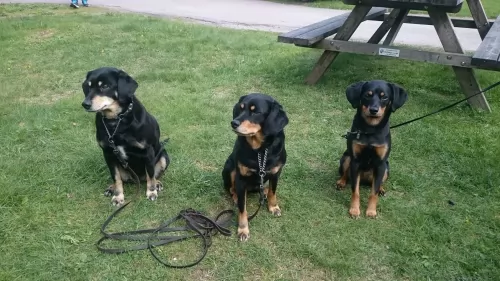 Choosing a good diet is imperative for the Smålandsstövare. Choose a commercially manufactured dog food high in vitamins and minerals.
Choosing a good diet is imperative for the Smålandsstövare. Choose a commercially manufactured dog food high in vitamins and minerals.
Give your dog a treat by providing him with some home-made food. It can be added into the dry kibble about twice a week as a treat. Boil brown rice and chicken in a pot and add in sweet potatoes, carrots and spinach. Chop all this up and give it to your dog in small portions. Also try to include some raw meat into the diet.
The Smålandsstövare is a very energetic breed and he is going to require some vigorous exercise every day. Take him for walks, allow him to run with you when you cycle or jog or take him swimming.